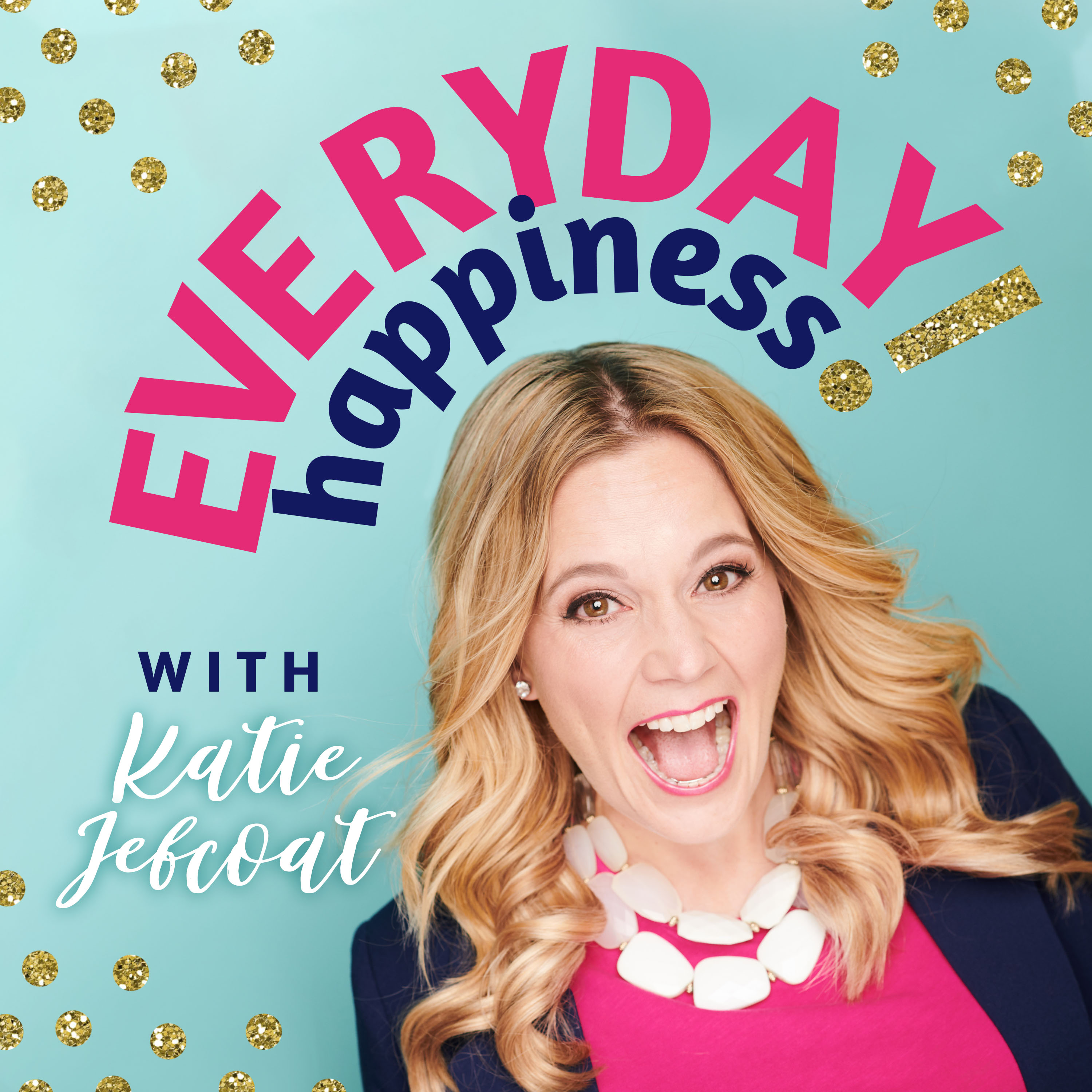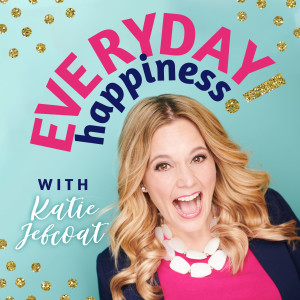
28.4K
Downloads
674
Episodes
Do you feel overwhelmed with your todo list? Is "creating fulfilling happiness" missing from that list? Everyday Happiness with Katie Jefcoat is here to help you. In 2-minutes a day, over time, you’ll discover how to reduce overwhelm and create lasting happiness through Katie’s signature method of Intentional Margins, happiness science, and musings about life. Start your day with a positive mindset. Many of us can get deep in the feeling of overwhelm. The anxiety of our own ambition can weigh heavily on our thoughts and emotions. We lay down and close our eyes at night and our chest begins to feel heavy. More items on the to-do list than the day before. How will we ever going to get off the hamster wheel of to-dos? When are we going to start living life for more than the hustle? As a recovering lawyer and passion driven entrepreneur, Katie knew something had to change. What she found is that you can have harmony, be intentionally productive and create massive impact, all at the same time - without feeling guilty. So she asked herself a simple question: "How can I get off the hamster wheel and how can I show others how to do the same? She knew she'd had a system for herself, but she’d never put it into defining words. On August 15, 2019, she sat down at her dining room table with her friend Jenna (her business bestie). Post-It notes covering the table. This is where she first defined the concept of Intentional Margins. What are Intentional Margins? INTENTIONAL MARGINS™ (n): A buffer of space and time to create harmony between your to-do’s and your priorities. Now you can get the support you need to manage your overwhelm, one little tip at a time. Regardless of the industry, Everyday Happiness blends inspiration with a pragmatic approach to finding Harmony. You'll be encouraged to throw “balance” out the window for a more achievable approach called harmony. Through Intentional Margins™, you'll be encouraged to develop what harmony means to you, by identifying your priorities at work and at home. Every day, we'll end the podcast help you feel equipped to jump off the hamster wheel of overwhelm and go out there and crush your day. --About the Host-- Katie Jefcoat is a community curator, speaker, author and motivator who supports ambitious women (and a few good men) move from feeling hectic to harmonious. As a recovering trial lawyer, she knows first hand what it feels like to have a demanding job. As an entrepreneur with a passion that lights her hair on fire and a busy family she’s in the thick of it with you. Many people strive for balance and think overwhelm is just a part of life. Sadly, the hustle culture and our never-ending to-do list is creating a life where our priorities are getting the leftover scraps of time. Katie introduces people to what she calls - Intentional Margins™ - a kind of life in which they reduce randomness, create harmony between their to-dos and their priorities and intentionally enjoy the meaningful parts of life - without feeling guilty. Without exposure to a different way, we remain stuck on the hamster wheel of to-dos and never find the “balance” we yearn for. Katie works diligently to expose her community to different ways of doing things, because she fundamentally believes we deserve to make time for our priorities. We deserve to live a life of harmony. And it’s within our control to create it. Katie curates a smorgasbord of content related to managing your calendar, handling overwhelm, setting boundaries, reducing randomness, saying no, self-care, the power of your choices, and more in her Intentional Margins™ Membership Community -- which she calls the coziest virtual coffee shop (on Facebook). Connect and learn more at www.katiejefcoat.com.
Episodes

Saturday Nov 27, 2021
179-How Our Mind Hinders Our Happiness #2
Saturday Nov 27, 2021
Saturday Nov 27, 2021
Our brains are super complex but sometimes the nuance gets lost when the wires cross between our conscious and subconscious, our prefrontal cortex and the limbic system. This is when we need to be super intentional and really think about why our intuition is telling us. This series will dive into some of the ways, the biases, our brain gets it wrong so that we can be better prepared the next time we notice this happening.
One way is relying on reference points as opposed to objective decisions, which we discuss right now.
Transcript:
Welcome to Everyday Happiness where we create lasting happiness, in 2 minutes a day, through my signature method of Intentional Margins® (creating harmony between your to-dos and your priorities), happiness science, and musings about life.
I'm your host Katie Jefcoat and I was listening to the Yale happiness course by Dr. Laurie Santos and she was talking about how our minds don’t think in terms of absolutes, we are constantly judging everything by our own reference.
This is why the studies have results when someone making $30,000 a year is asked what would you need to be even happier and they say $50,000 but when you ask someone making $100,000 they say $250,000. Our minds are judging what would make us happier by our surroundings - our reference points. And quite frankly, 50,000 or even 75,000 might make us just as happy. We already know that money doesn’t buy us happiness.
So we’re talking about a REFERENCE POINT as a salient point, (the most noticeable but often completely irrelevant) point against which all subsequent information is compared, because we're judging all the time.
So, in the scenario of salary, the reference point is what we used to make. It’s not done in absolute objective terms.
One of the most famous examples of this is seen through the olympics. We watch these sporting events and some athletes take the podium and some don’t. So if I were to show you a photo of one of the greatest swimmers of all time, Michael Phelps on the podium with his gold medal, he would look happy. But what’s interesting is the silver medalist looks less happy. But he just won a medal at the olympics, which is a huge deal. And then, if we turn to the bronze medalist, he looks as happy if not happier than the gold medalist. But why? It’s all relative.
The silver medalist sees a reference point of being so close to winning the gold medal but falling short. And the bronze medalist sees a reference point of not making it on the podium at all and just being so darn happy to be there.
All of these athletes are experiencing a different salient reference point. Our minds don’t think in terms of absolutes - it’s clouded by our salient reference points.
Researchers studied olympic athletes in exactly this scenario over and over and what they found was silver medalists were less happy than the bronze medalists over and over again.
Today, I invite you to consider your reference points when thinking about your wants.
The science mentioned in this episode can be reviewed at: Medvec et al. (1995). When less is more: Counterfactual thinking and satisfaction among Olympic medalists. Journal of Personality and Social Psychology, 69(4), 603–610.
Get Everyday Happiness delivered to your inbox by subscribing at: https://www.katiejefcoat.com/happiness
And, let’s connect on social at @everydayhappinesswithkatie and join the community on the hashtags #IntentionalMargins and #everydayhappinesswithkatie on Instagram
Links: https://onamission.bio/everydayhappiness/

No comments yet. Be the first to say something!